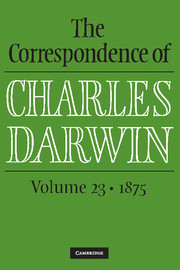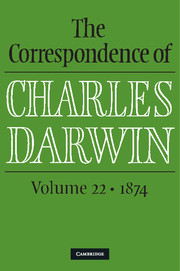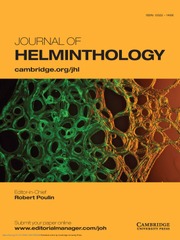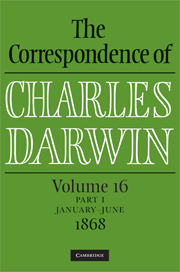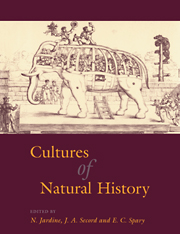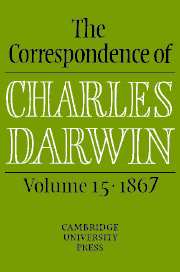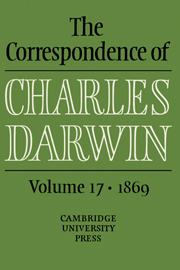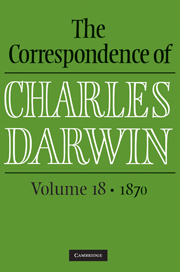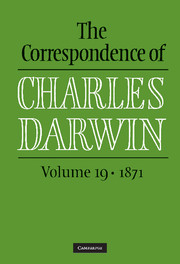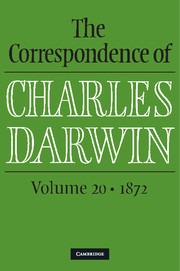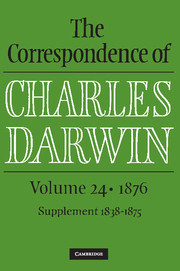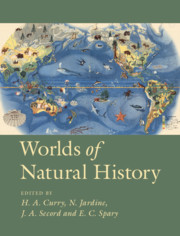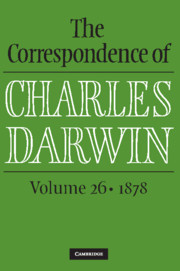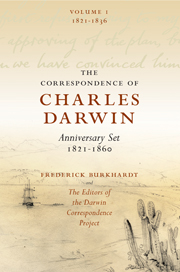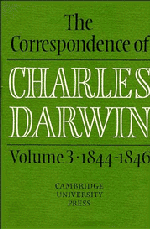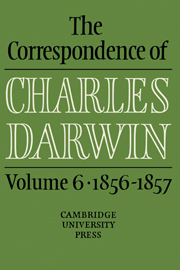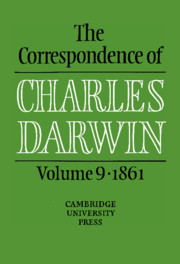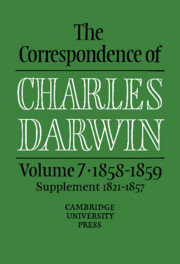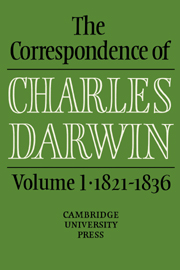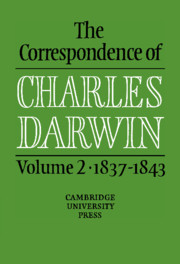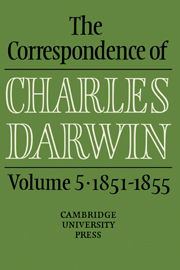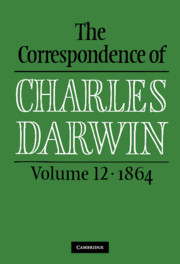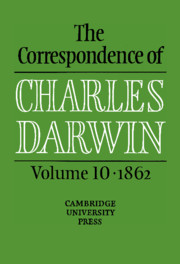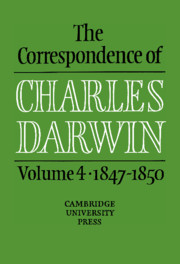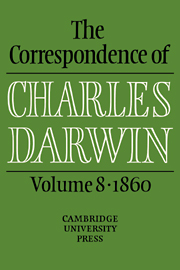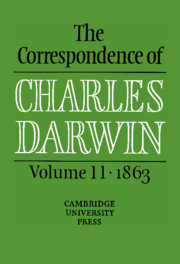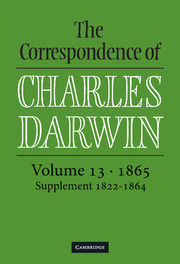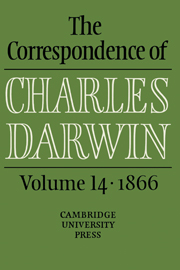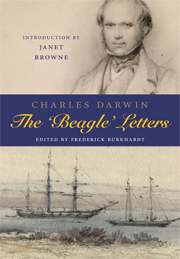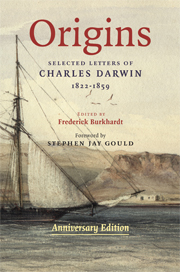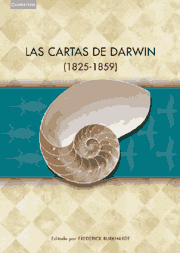The Correspondence of Charles Darwin
Volume 23. 1875
$147.00 (R)
Part of The Correspondence of Charles Darwin
- Real Author: Charles Darwin
- Editors:
- Frederick Burkhardt, American Council of Learned Societies
- James A. Secord, University of Cambridge
- The Editors of the Darwin Correspondence Project
- Date Published: March 2016
- availability: Available
- format: Hardback
- isbn: 9781107134362
$
147.00
(R)
Hardback
Other available formats:
eBook
Looking for an examination copy?
If you are interested in the title for your course we can consider offering an examination copy. To register your interest please contact [email protected] providing details of the course you are teaching.
-
This volume is part of the definitive edition of letters written by and to Charles Darwin, the most celebrated naturalist of the nineteenth century. Notes and appendixes put these fascinating and wide-ranging letters in context, making the letters accessible to both scholars and general readers. Darwin depended on correspondence to collect data from all over the world, and to discuss his emerging ideas with scientific colleagues, many of whom he never met in person. The letters are published chronologically: Volume 23 includes letters from 1875, the year in which Darwin wrote and published Insectivorous plants, a botanical work that was a great success with the reading public, and started writing Cross and self fertilisation in the vegetable kingdom. The volume contains an appendix on the 1875 anti-vivisection debates, with which Darwin was closely involved, giving evidence before a Royal Commission on the subject.
Read more- Complete transcriptions of more than 600 letters written and received by Charles Darwin in 1875, providing for the first time primary materials of immense value to researchers across a range of disciplines
- Clear and concise explanatory notes make the material easily accessible for both scholars and general readers, and a complete biographical register provides brief notes on people mentioned in the letters
- A narrative introduction gives a concise and highly readable account of Darwin's life in 1875, the year in which he published Insectivorous plants and began work on Cross and self fertilisation in the vegetable kingdom
Reviews & endorsements
Reviews of earlier volumes:
"Nothing in recent history of science quite tops the achievement of the volumes of Darwin correspondence. It is our own Human Genome Project."
Annals of ScienceSee more reviews"… a superb series … beautifully produced, beautifully readable, efficiently indexed, supportively but not gossipily annotated."
The Times Literary Supplement"Every now and then … publishing and academe work together to produce books so splendid that it seems ungrateful not to acquire them: this promises to be another such."
The Guardian"… this authoritative work is a model of scholarship in both its comprehensiveness and supporting documentation which provides a rich source of background, biographical and bibliographical detail."
The Naturalist"These volumes are indeed treasures of high scholarship … every real science library needs this series."
Trends in Ecology and Evolution'… slowly but surely we are getting an unbelievable source of information on one of the greatest of scientists who ever lived and thought and worked. Who knows what treasures future generations will uncover? For now, as always, the edition is exemplary, with huge amounts of pertinent information in the notes and with amazingly accurate transcriptions of Darwin’s appalling handwriting. A true monument of scholarship. My fervent hope is that I shall live to see the completion.' Michael Ruse, The Quarterly Review of Biology
'… this latest volume of The Correspondence of Charles Darwin shares the same high production values, attention to detail and scholarly scrupulousness evident in all its predecessors. Amongst the six appendices, for example, are a list of all the periodical reviews of Insectivorous Plants and a hugely valuable account of Darwin’s dealings with the question of vivisection, including the text of his testimony to the Royal Commission on the vexed issue.' Gowan Dawson, British Journal for the History of Science
Customer reviews
Not yet reviewed
Be the first to review
Review was not posted due to profanity
×Product details
- Date Published: March 2016
- format: Hardback
- isbn: 9781107134362
- length: 840 pages
- dimensions: 241 x 162 x 51 mm
- weight: 1.42kg
- contains: 22 b/w illus.
- availability: Available
Table of Contents
List of illustrations
List of letters
Introduction
Acknowledgments
List of provenances
Note on editorial policy
Darwin/Wedgwood genealogy
Abbreviations and symbols
The correspondence
Appendix I. Translations
Appendix II. Chronology
Appendix III. Diplomas
Appendix IV. Presentation lists for Insectivorous plants and Climbing plants 2d ed.
Appendix V. Reviews of Insectivorous plants
Appendix VI. Darwin and vivisection
Manuscript alterations and comments
Biographical register and index to correspondents
Bibliography
Notes on manuscript sources
Index.
Sorry, this resource is locked
Please register or sign in to request access. If you are having problems accessing these resources please email [email protected]
Register Sign in» Proceed
You are now leaving the Cambridge University Press website. Your eBook purchase and download will be completed by our partner www.ebooks.com. Please see the permission section of the www.ebooks.com catalogue page for details of the print & copy limits on our eBooks.
Continue ×Are you sure you want to delete your account?
This cannot be undone.
Thank you for your feedback which will help us improve our service.
If you requested a response, we will make sure to get back to you shortly.
×
